By Qinghai | September 12, 2017
With NoSQLBooster for MongoDB, you can run SQL SELECT Query against MongoDB. SQL support includes functions, expressions, aggregation for collections with nested objects and arrays.
See the features and SQL examples supported by the NoSQLBooster for MongoDB.
Let's look at how to use the GROUP BY clause with the SUM function in SQL.
Instead of writing the MongoDB query which is represented as a JSON-like structure
1 | db.employees.aggregate([ |
You can query MongoDB by using old SQL which you probably already know.
1 | mb.runSQLQuery(` |
Features
- Access data via SQL including WHERE filters, ORDER BY, GROUP BY, HAVING, DISTINCT, LIMIT
- SQL Functions (COUNT, SUM, MAX, MIN, AVG)
- SQL Functions (Date, String, Conversion)
- SQL Equi JOIN and Uncorrelated SubQuery
- Aggregation Pipeline Operators as SQL Functions (dateToString, toUpper, split, substr...)
- Provide a programming interface (mb.runSQLQuery) that can be integrated into your script
- Autocomplete for keywords, MongoDB collection names, field names, and SQL functions
Please note that MongoDB does not natively support SQL features. The SQL query is validated and translated into a MongoDB query and executed by NoSQLBooster for MongoDB. The Equivalent MongoDB Query can be viewed in the console.log tab.
It should be mentioned that there is a tutorial on NoSQLBooster SQL Query for MongoDB in the lower left “Samples” pane. With this tutorial, you can learn and understand how to use NoSQLBooster SQL Query for MongoDB. Better yet, all SQL Functions provide the appropriate code snippets and mouse hover information and support code completion.
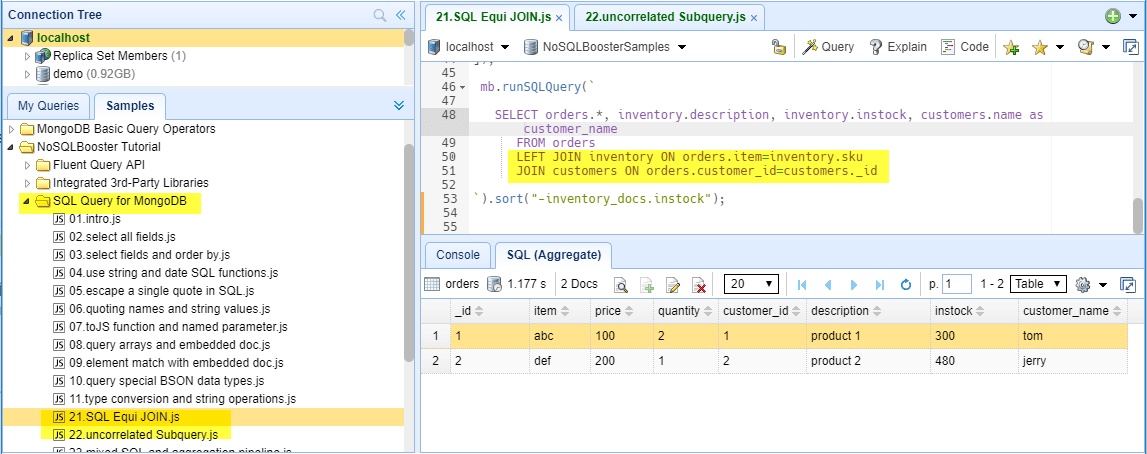
Getting Started
For example, the employees' collection has the following fields including number, first_name, last_name, salary, department, and hire_date.
Prepare Demo Data
Insert the following demo data to MongoDB. Open a shell tab "Command-T" and execute the following script to get the employees collection.
1 | db.employees.insert([ |
Select All Fields
First, click on employees collection, then click on "SQL Query Tab" in the tab toolbar or use the "Command-Alt-T" keyboard shortcut. A basic "SELECT * from employees" is automatically generated for us! NoSQLBooster for MongoDB also offers a "runSQLQuery" code snippets. Just type a snippet prefix "run", and press "tab" to insert this snippet.
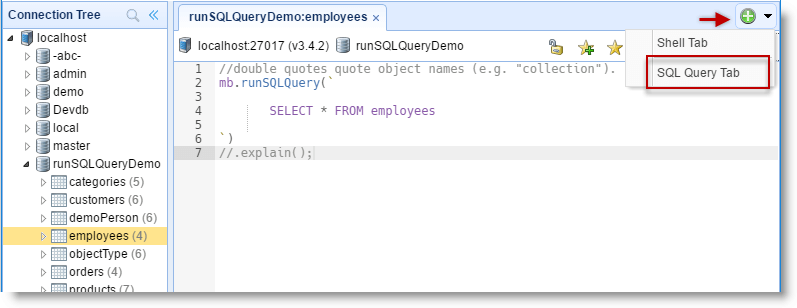
Just execute the query by clicking the execute button or use the "Command-Enter" keyboard shortcut. This would produce the result as shown below.
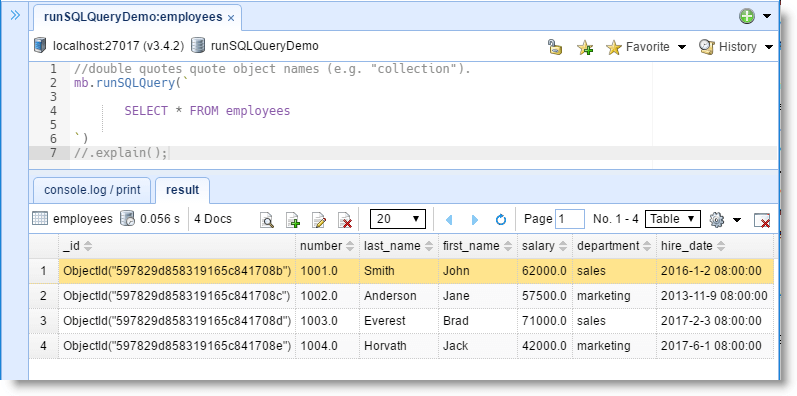
- NoSQLBooster for MongoDB provides in-place editing in result tree view. Double-click on any value or array element to edit. Pressing "Esc" return the previous value and exit the editor.
- If you want the results not to be edited directly, you can enable the "read-only" mode by clicking the lock button in the toolbar.
Select Individual Fields and Field Name Auto-complete
Let's fetch the first_name, last_name and salary fields of the employees available in employees table and sort the result in the descending order by salary.
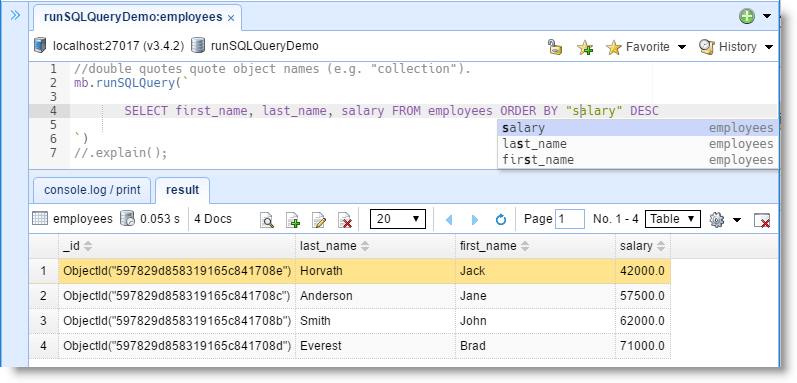
The built-in SQL language service knows all possible completions, SQL functions, keywords, MongoDB collection names, and field names. The IntelliSense suggestions pop up as you type. You can always manually trigger it with "Ctrl-Shift-Space"}}}. Out of the box, "Ctrl-Space"}}}, "Alt-Space"}}} are also acceptable triggers.
View the Equivalent MongoDB Query
How to show the equivalent MongoDB query?
- Method 1: Turn on the Verbose Shell option, Main Menu-> Options -> Verbose Shell(setVerboseShell)
- Method 2: Click the "Code" button in the upper-right corner of the editor toolbar to show the equivalent MongoDB query.

As you know, NoSQLBooster for MongoDB supports mongoose-like fluent Query API, Click Menu-> Options -> Translate SQL to MongoDB Shell Script, click "Translate SQL to NoSQLBooster for MongoDB Fluent API". Re-execute the script, the equivalent fluent MongoDB query will be shown in the "console.log/print" tab.

Use String and Date SQL Functions
This time, we want to find all employees who are hired this year, and display first_name and last_name as full name. Please enter the following SQL statement and click execute button:
1 | SELECT concat("first_name", ' ', "last_name") as fullname, |
Clicking on the "console.log/print" tab to show the equivalent MongoDB query:
1 | db.employees.aggregate( |
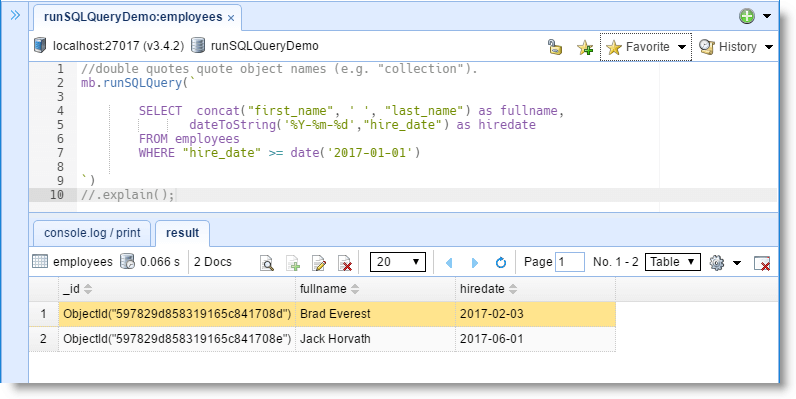
Let us look at concat function concat("first_name", ' ', "last_name"). The concat function is a MongoDB string aggregation operators. Through mapping SQL functions to MongoDB operators, NoSQLBooster for MongoDB allows you to use all MongoDB aggregation operators as SQL functions in you SQL statement.
1 | // instead of writing |
- No $ prefix with MongoDB operator and collection field name.
- Double quotes quote field name. Single quotes are for strings.
- All function names are case-sensitive except for COUNT, SUM, MAX, MIN, AVG.
- We can use the standard SQL comparison operators: =, !=, <>, <, <=, >=, or >.
The date function converts a string to a MongoDB Date type. NoSQLBooster for MongoDB uses Moment.js to parse date string. When creating a date from a string, Moment.js first check if the string matches the known ISO 8601 formats, Moment.js then check if the string matches the RFC 2822 Date time format before dropping to the fall back of new Date(string) if a known format is not found.
Please refer to Moment.js parse string document to view all supported string formats.
1 | # An ISO 8601 string requires a date part. |
The dateToString is another MongoDB date operator to convert a date object to a string according to a user-specified format. The $dateToString expression has the following syntax:
1 | { $dateToString: { format: <formatString>, date: <dateExpression> } } |
As SQL functions doesn't support JSON object parameter, NoSQLBooster for MongoDB converts the object param as plain parameter list.
1 | dateToString('%Y-%m-%d',"hire_date") as hiredate |
The first parameter is formatString, single quotes, the second parameter is "Date Field", double quotes.
Please follow this link to learn more about MongoDB date aggregation operators.
Quoting Names and String Values
In NoSQLBooster, we follow ANSI SQL standard. Single quotes delimit a string constant or a date/time constant. Double quotes delimit identifiers e.g., collection names or column names. This is generally only necessary when your identifier doesn't fit the rules for simple identifiers.
The following SQL statement selects all the customers from the department "sales," in the "employees" collection:
1 | SELECT * FROM employees WHERE department='sales'; |
The equivalent MongoDB query
1 | db.employees.find({ |
Single quotes are for strings. If you double quotes "sales," NoSQLBooster for MongoDB treat it as a column "sales," not a string 'sales'.
1 | SELECT * FROM employees WHERE department="sales"; |
The SQL generated the following MongoDB query that you may not want
1 | db.employees.aggregate( |
Stick to using single quotes.
Explain Data for the Query
Just add a new line ".explain()" to the end of mb.runSQLQuery and click execute button again. It returns the information on the processing of the pipeline.
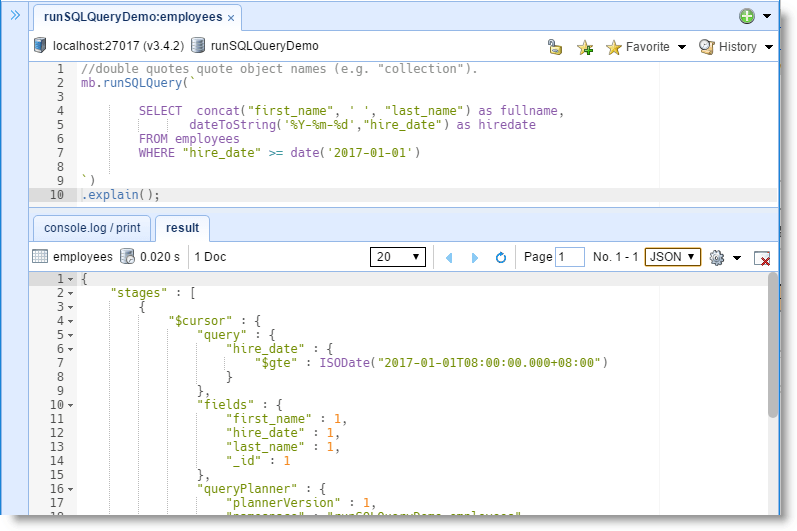
Querying Special BSON Data Types, UUID, BinData, DBRef...
To query values of these particular BSON Data types, write the values as you would in the MongoDB shell. All MongoDB build-in Data Types functions are available.
1 | --date |
Accessing Arrays and Embedded Documents
Nested documents (sub-documents) and arrays including filters and expressions are supported. You can access such fields using a dotted name.
Given the following documents in the survey collection:
1 | db.survey.insert([ |
The "product" and "score" would be referenced as results.product and results.score respectively:
1 | SELECT * FROM survey WHERE results.product = 'xyz' AND results.score >= 8; |
or
1 | SELECT * FROM survey WHERE "results.product" = 'xyz' AND "results.score" >= 8; |
Element Match with Embedded Documents
The elemMatch query criteria (score >=8) will be translated as "score": { "$gte": 8 }. This syntax is more concise and expressive.
1 | -- Enter "elemMatch [Tab]", to trigger auto-complete |
SQL Equi JOIN
NoSQLBooster supports SQL Equi JOIN which performs a JOIN against equality or matching column(s) values of the associated tables.
An equal sign (=) is used as comparison operator in the where clause to refer equality.
NoSQLBooster supports INNER JOIN and LEFT JOIN, OUTER JOIN is not supported.
- (INNER) JOIN: Returns records that have matching values in both tables
- LEFT JOIN: Return all records from the left table, and the matched records from the right table
Equi JOIN will be translated as MongoDB $lookup stage. (MongoDB 3.2+) refer to: https://docs.mongodb.com/manual/reference/operator/aggregation/lookup
1 | SELECT * FROM orders JOIN inventory ON orders.item=inventory.sku |
The "toJS" SQL Function and named parameter
The “toJS” helper function transforms the named parameters and arithmetic operator into a JSON object, also transforms an ordinary parameter list into an array.
1 | toJS(k='v'); //result {k:'v'} |
With named parameter and "toJS" helper function, you can query complex objects or pass JSON-object parameter to a SQL function.
1 | --elemMatch, named parameter and Arithmetic operators |
Mixed use of SQL and Chainable Aggregation Pipeline
NoSQLBooster for MongoDB translates SQL to MongoDB find/aggregate method which returns a AggregateCursor. All MongoDB cursor methods and NoSQLBooster for MongoDB's extension methods can be called. This also allows NoSQLBooster Intellisense to know all AggregateCursor's chainable stage methods. (sort, limit, match, project, unwind...)
1 | mb.runSQLQuery(` |
The equivalent MongoDB Query is a bit longer.
1 | db.survey.aggregate( |
Save SQL Query as MongoDB Read-only View
You can use the extension method "saveAsView" to save SQL Query result as a MongoDB read-only view.
1 | //double quotes quote object names (e.g. "collection"). Single quotes are for strings 'string'. |
You can also use the forEach method to apply a javascript method to each document.
1 | mb.runSQLQuery("SELECT * FROM employees WHERE hire_date >= date('2017-01-01')") |
SQL Snippets
NoSQLBooster includes a lot of SQL-specific code snippets to save you time, Date Range, Text Search, Query and Array, Existence Check, Type Check and so on. You can always manually trigger it with "Ctrl-Shift-Space"}}}. Out of the box, "Ctrl-Space"}}}, "Alt-Space"}}} are acceptable triggers.
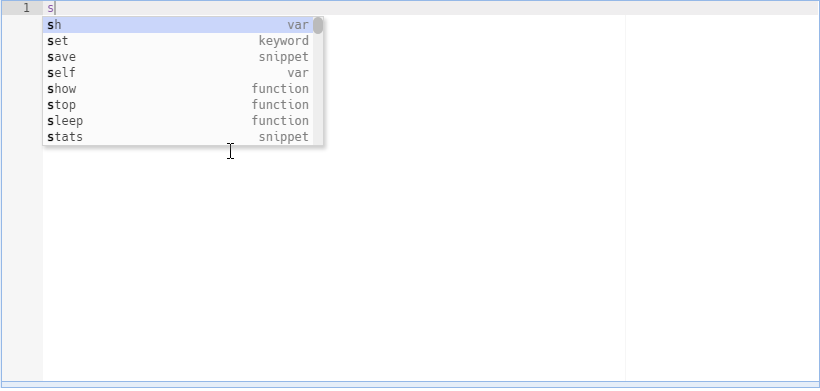
SQL Date Range Snippets
1 | -- Enter "daterange [Tab]," then..., today, yesterday, lastNDays |
Text Search Snippets
1 |
|
The equivalent MongoDB Text Search
1 | db.collection.find({ |
Query an Array ($all and $elemMatch) Snippets
The $elemMatch operator matches documents that contain an array field with at least one element that matches all the specified query criteria.
- Element Match with Embedded Documents
The elemMatch query criteria (quantity>2, quantity<=10) will be translated as *** "quantity": { "$gt": 2, "$lte": 10 }***. This syntax is more concise and expressive.
1 | -- Enter "elemem [Tab]", then... |
The equivalent MongoDB Query
1 | db.survey.find({ |
- Element Match
1 | -- Enter "elem [Tab]", then... |
The equivalent MongoDB Query
1 | db.survey.find({ |
The $all array operator selects the documents where the value of a field is an array that contains all the specified elements.
1 | -- Enter "all [Tab]", then... |
Existence Check and Type Check Snippets
- Existence Check ($exists)
1 | -- Enter "exists [Tab]", then... |
- Querying by Multiple Data Type ($type)
1 | -- Enter "typeSearch [Tab]", then... |
Complete List of SQL Support
To check out the complete list of SQL Support, visit this link.
Thank you!
Please visit our feedback page or click the “Feedback” button in the app. Feel free to suggest improvements to our product or service. Users can discuss your suggestion and vote for and against it. We’ll look at it too.